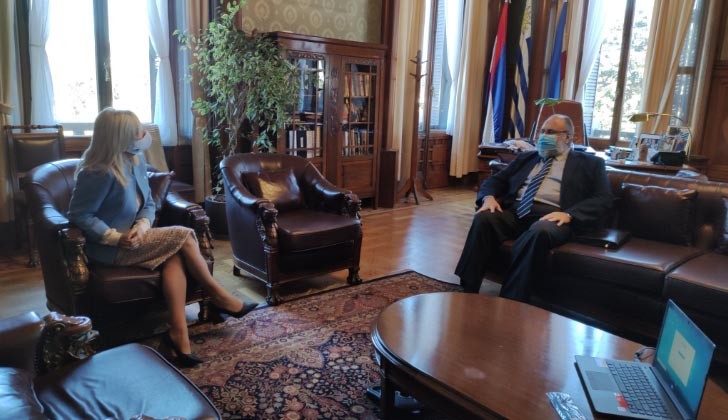
For this Tuesday at noon, the vote on 26 articles is scheduled in the Plenary of the Constitutional Convention (CC), that is, by the total number of conventions. The report comes from the Commission on Knowledge and Culture Systems, and contains a section that establishes the right of creators to take advantage of their work, which caused two sides of the cultural world to divide. A group of cultural groups sent a letter assuring that the article could benefit the industry, and others called for the proposal to be approved with a document that included 400 signatories, and that was released by the National Union of Artists.
Among the other sections that will be covered are the freedom and limits of research, the right to protection of personal data, the right to open access to public information, among others.
The article to vote:
“Right to benefit from moral and material interests. All persons, individually and collectively, have the right to benefit from the protection of moral and material interests in cultural, scientific, artistic creations or productions and others related to knowledge in general, of which they are authors or performers.
“These rights include the exploitation and use of the work or interpretation, for a time that will not be less than the life of the owner, as well as the recognition of the creation, disclosure and integrity of these, in accordance with what is established by law. .
“The material right of authors or performers shall be subject to the provisions of property rights established by this Constitution, in terms of its guarantees, limitations and social function, and the law must ensure its protection as well as that of other cultural rights, the protection of ancestral knowledge and the enjoyment of the benefit of knowledge”.
“Moral rights are protected on the one hand, that the name of an author can be associated with his creation, and on the other, which is what refers to the material, that an author can participate in the economic terms that his work collects ”, assures Bárbara Negrón, general director of the Observatory of Cultural Policies (OPC), about the section that will be voted this Tuesday by the hemicycle.
According to Negrón, “the creators are faced with large companies, they need tools to defend themselves” in order to be able to participate in the profits from the dissemination of their works and live from their work.
“That the law allows, on the one hand, to consecrate and protect in a fairly clear way the copyright of creators and performers, and on the other, to allow citizens to also access those creations and that knowledge,” assured the coordinator of the commission, Ignacio Achurra (Frente Amplio), in an interview with The counter.
The coordinator explained that in the case of copyright they wanted to frame their limits around their social function, and exemplified with the photocopies of books that are made in universities.
The reluctance of a path in the world of culture
Through a letter, 27 groups of mostly alternative cultural groups, such as the Chilean Art Assembly, the Center for Aesthetic and Latin American Research of the University of Chile, and the Perrera Arte Experimental Center, among others, called for the article to be rejected. .
Their reasons were written in a document published in March. One was the elimination of the concepts of “common good and fair use” from the report that will be presented to the plenary on Tuesday. From the absence of these words, they assured that “the capitalist and neoliberal dimension (of the current Constitution) would be strengthened, which excludes the right to be granted adequate development conditions to the majority of creators, and at the same time denies the enjoyment of the works to the majority of Chileans and Chileans”.
According to “fair use”, they described that it is enshrined in much of the world and consists of an “exception to copyright when the legitimate use of content is necessary for the promotion of creation, research, studies, cultural scope , scientific innovation for the benefit of creators and society”. They exemplified with the use of appointments without economic purposes.
Lastly, they disagreed that the material right of authors and performers is subject to the same treatment as property, since “physical and intellectual assets have very different origins and characteristics, such as the capacities of reproduction, transmission and inheritance/expiration” . They pointed out that the protection of the material interests of the authors would be put at risk in the event that the rights are handed over to new owners, or to “the industry”, as stated in the document.
Samuel Toro, a graduate in Art and a doctorate in Interdisciplinary Studies on Thought, Culture and Society at the University of Valparaíso, in a column in The counter (April 3), showed reluctance that the material right of authors be subject to property rights.
“The materiality of a creation, or invention, can be acquired and/or protected as such, but the moral right (which is not a material right) should remain even though the creation is acquired by an individual, an industry, even the state,” he wrote.
The PhD in Interdisciplinary Studies on Thought, Culture and Society assured that, as it is written, and if the “work is understood as material and not intellectual property”, the creator is not protected, but rather the “owner of the work ”, which according to Toro could be the person who acquires a creation through a purchase, for example.
Another issue that he underlined as negative is leaving the years of copyright protection undetermined. In Chile there are 70 and, according to Toro, not explaining it could produce uncertainty in those who want to maintain this term or reduce it and that “a greater number of years could be legislated, which would delay the passage to the public good.”
Francisco Brugnoli, former director of the Museum of Contemporary Art, said – in an interview with Radio Bío Bío– that “the principles of trade are taking precedence over general cultural exercises” (March 31).
supports in favor
Signed by more than 400 creators – among them the pianist Valentín Trujillo, the singer Tommy Rey, the audiovisual director Andrés Waissbluth, the visual artist Arturo Duclos, the actress and theater director Claudia di Girolamo, the documentary filmmaker Cristián Leighton and the singer Nano Stern – and released by the National Union of Artists in March, they call on the conventional to approve the article.
“This is a virtuous equation that allows the development of a culturally rich and diverse country and that generates sustainable cultural growth, especially with a view to the societies of the future, where the contents developed by creators from various areas are becoming more and more prominent. in a highly technological and digitized world,” the letter stated.
The cards are laid, the power of decision is held by the Plenary.

















